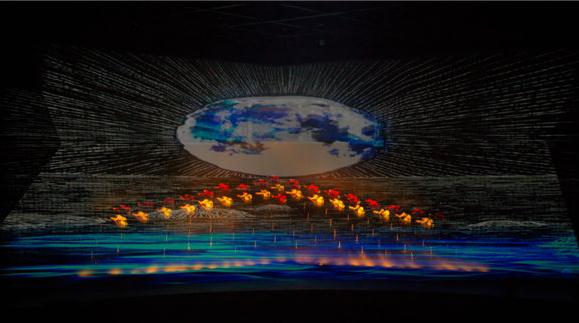

An interactive entrance and everyman's quest for enlightment turn a play at Wutai Mountain into a journey of self-discovery.
People attending the ongoing show Encore Wutai Mountain can get lost as soon as they enter the theater. They don't walk into the auditorium—they walk into a winding space that evokes the bedroom of your childhood, the classroom of high school and the dormitory at college, with the repeated recordings of parents' reminders, teachers' words and conversations between first-time lovers.
At the end of the lane, audience members find themselves in a bustling community where all of those everyday scenes of life are acted out: trivial quarrels with a spouse, criticism from a boss, parents scolding kids or struggling to care for dying parents in a hospital.
When the lights come full on, the audience finds itself on the stage, surrounded by the settings and performers. Then they will be guided offstage into the auditorium.
"You walk through your life with hundreds of problems, and now you come to Wutai Mountain and wish the Buddha would give you some answers or inspiration," says director Wang Chaoge. That, she says, is the inspiration for the unexpected way of entering the show.
She says she came to the mountain last year with the question of how to create the show. She stayed there for about nine months, visiting many temples, reading the history and legends of the mountain, and asking head monks for advice. After putting in her own thoughts as well, she says people in the audience must now find their own answers from the show.
Located in North China's Shanxi province, Wutai is one of the four sacred Buddhist mountains in the country, seen as the global center for the worship of Manjusri (known as Wenshu in China), an avatar of the Buddha who represents transcendent wisdom. Once there were more than 120 temples; 47 now remain, including Foguang Temple of the Tang Dynasty (618-907) and Shuxiang Temple of Ming Dynasty (1368-1644). It was declared a UNESCO World Heritage Site in 2009.
Shanxi province is known for its coal industry. In order to promote its culture, the leaders commissioned Wang, who is among Chin's top directors of tourist shows, to create productions for the province.
Wang's previous productions were all staged in the open in southern China, but in the north, it's impractical to run open-air shows in late autumn and winter.
Her first production in Shanxi was Encore Pingyao. Pingyao was a financial center of China during the Qing Dynasty (1644-1911) and is now a well-preserved ancient town. The theater is composed of two parts: one like a film studio with ancient streets, shops, courtyards and performers; the other a stage and auditorium setting.
Classical opening for new theater
2014-09-30Youth theater festival puts focus on creativity
2014-08-21Copyright ©1999-2018
Chinanews.com. All rights reserved.
Reproduction in whole or in part without permission is prohibited.